
Antibiotics: Your horse's digestive foe?
Veterinarians and horse owners are often faced with cases that include some type of infection or risk of infection. When this happens, antibiotics undoubtedly enter the treatment regimen.
Right?
Not exactly. Veterinarians will take into consideration a number of factors before prescribing your horse antibiotics, such as the implications of antibiotic resistance, overall health of your horse or the state of their digestive system.
Your horse has a unique fermentation process that occurs in the cecum and large colon. This process relies heavily on normal levels of microflora (bacteria) to digest fiber, which is a main ingredient in most equine diets. Because of this, your horse is considered a "hindgut fermenter" and is especially susceptible to the negative effects that antibiotics can have on the digestive system.
To efficiently and properly digest food, these beneficial bacteria must be in balance; meaning that the proper percentages must be populating the hindgut and must be healthy. The bacterial health of the colon is dependent on many factors including pH, food for the bacteria and motility (movement) of the hindgut.
When the environment for the bacteria is not correct, the normal bacteria may be low in numbers, not be as functional as they should be or, worse yet, dead. Once the bacteria colony upset occurs, the colonic environment can become conducive to the growth of unwanted, or even toxic, strains of bacteria.

One of the issues with antibiotics is that they are not very specific or targeted, which means they can affect more than one strain of bacteria and they do not work solely at the site of infection. When a horse is placed on antibiotics, some change in the balance of the hindgut microflora is inevitable. Many times, although a change is occurring in this population and digestive efficiency is reduced, the effects are not seen outwardly.
Occasionally, the effects can be significant enough that profound changes are seen such as diarrhea, colic or, in severe cases, there may be toxicity within the bloodstream caused by an overpopulation of the bad bacteria. If your horse begins an antibiotic regimen, your veterinarian may suggest that you begin feeding your horse a daily probiotic - especially if they exhibit signs of hindgut disturbance.
Probiotics come in many forms and new developments in equine digestive health have proven that a combination of prebiotics and probiotics, including high quality yeasts, are most effective in maintaining or re-establishing colonic health.
So, the next time your horse is facing a situation that requires antibiotic therapy, it is important to discuss the effects of these treatments on their digestive health with your veterinarian. They will likely have valuable information for you as well as a recommendation for a quality digestive aid to support your horse through their therapy.

